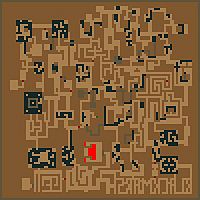Arena:Easter Eggs
| This page is for Easter eggs only. Easter eggs include inside jokes, pop culture references, and any similar reference to something outside the Elder Scrolls games. For other points of interest, please see the appropriate pages. |
Easter Eggs are secrets that the developers put in games to give people a laugh when they find them (provided that they understand the joke or reference). Arena has a large number of such jokes. Easter eggs differ from in-game references in that they have been clearly hidden from the player and are unusual with regards to their surroundings; references are often integrated into the rest of game and no attempt is made to keep them secret.
If you think you have found an Easter egg please post your idea on this article's talk page before adding it to this article.
Easter Eggs[edit]
Mirror Map[edit]
Hidden in the map of the second level of the Mines of Khuras is the compound word "Blackmarsh", which has been mirrored to make it harder to notice.
Ria Silmane[edit]
In a 2018 interview on YouTube with Indigo Gaming, game designer Ted Peterson mentions that the part of Ria Silmane was played by one of Arena's programmers.[1] This can be seen to be Jennifer Pratt when looking at the photo of the development team.
Theodorus[edit]
In the same 2018 interview, Peterson also discussed how he used a play on his own name for the answer to one of the riddles in the Halls of Collossus.[1]
Cultural References[edit]
Dungeons and Dragons[edit]
Arena is heavily inspired by D&D[1] and as such bears certain similarities:
- The Staff of Chaos appears to have been drawn heavily from the D&D artifact, the Rod of Seven Parts. Both items have been broken into several pieces and must be reassembled. Additionally, the Rod was originally named the "Rod of Law" (law and chaos being the original alignment choices for characters).
- The Oghma Infinium is named after a Celtic deity of wisdom. Initially, Ted Peterson created a quest during a D&D campaign to find a great tome called the "Orcus Infinium", authored by the demon Orcus, and as Orcus was trademarked the name was changed to Oghma.[2]
Name Generation[edit]
The name generator may appear random, but many of the part-names are references to historical or otherwise fantasy works:
- Jewish mythology
- Lil-ith (Dark Elf)
- Christian mythology
- Cas-par, Golg-othah, Tab-ithah (Dark Elf)
- Islamic mythology
- Ak-bar, Fa-tima, Moham-med, Om-ar, Sha-hrazad (Khajiit)
- Babylon
- Hammu-rabi (Khajiit)
- Ancient Greece
- Cas-sandra (Wood Elf), Andro-cles, Aph-rodite, Art-emis, Ath-ena, Her-acles, Per-seus, Theo-dorus (Argonian)
- Ancient Rome
- August-us, Cae-sar, Calig-ula, Ca-ssius, Gal-lus, German-icus, Jul-ius, Pil-ate, Tib-erius (Argonian)
- Matter of Britain
- Ava-lon (Dark Elf), Gwyn-yvyra, Morg-anna, Trist-ane, Trist-yn, Ys-olda (Breton)
- The Lord of the Rings
- Ara-gorn, Lego-las (Wood Elf), Gan-dalf, Mith-ril, Saru-man, Sau-ron (High Elf)
- Developers
- Theodore (Breton), Soltani (Khajiit)
Province Names[edit]
Many of the province names originated from other fantasy works:
- Hammerfell is named for the novel The Heirs of Hammerfell by Marion Zimmer Bradley
- Valenwood is the name of a type of tree from Dragonlance
- Morrowind is named after Morrowindl, a volcanic island home to elves in The Elf Queen of Shannara, and the shape of the Black Isle is directly inspired by the map of Morrowindl
- The Blue Divide is named after the body of water of the same name from Shannara
- Alinor (later an alternate name for Summurset) is named after Valinor, homeland of the Valar and Elves in J. R. R. Tolkien's legendarium
See Also[edit]
Citations[edit]
|
|||||||||||
